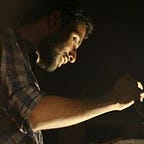The Indian Book of the Dead and the Living
Deadfish floating on the Ganga are a statistic. It’s as if they were only ever loved, if ever, by the person tallying their numbers in the excel file. Now we know Nietzsche was right. The sacred can indeed die. Now we know that even the Himalayas can sink back into the earth and everything can be adjacent to everything else. The most dehumanizing image is a scroll away from the smile of the only person who has ever loved me. In a true democracy, only numbers matter and that smile has only one customer. And yet that smile saves me from being another deadfish floating on the Ganga.
Why do I talk of the sacred? Vivekanada was once asked by Paramhansa to ask Kali whatever he wished for. He went inside the temple knowing he would ask her to end his poverty. But standing in her presence, he forgot the world. When he came out, he felt stupid for not having asked her for money. Paramhansa sent him in again. But he forgot, again. And again, and again, and again. This is the perfect time to remember the sacred. A thing that inspires awe stands apart. It stands above us and it is an important time to rediscover the act of looking up.
The sacred makes sacred everything that enters its abode. As an artist, they ask you to trade in your aesthetic for an anesthetic that will keep you asleep for decades. I will not float dead on the Ganga. I will cross the threshold of the sacred, and then let Kali call forth the river of self through me.
Is it easy? The difficulty isn’t because I am alone. I am not alone. The difficulty is in being the only man to know he is not alone. There is so much fear that the small murmuring stream feels coming out of the Himalayas. But how does it matter that it is afraid of losing its path in nameless forests and being lapped up by the burning sun? It wills to be the Ganga, then Ganga it is, and Ganga it will become.
Those who want to know the self aren’t interested in the answer.They are more interested in the certainty the answer would bring. If you want to know the self, you should make friends with paradoxes. To fishermen returning with a catch, Ganga is nourishment. To a cartographer, Ganga is a shifting course, an arcing line. To a flooded village, the arc is of unmitigated suffering. To a historian, Ganga is unsubdued chaos.
In a true democracy, only numbers matter and the smile we talked about has only one customer. By making true equality the only virtue, we sanctify all forms of democracies. A democracy is sacred, regardless of if it is one of cannibals or one of lovers. To a cannibal, a lover is an ascetic. To a country of cannibals, a lover is a threat to be nailed to a cross. Muck in large quantities is still muck.
Doesn’t this muck call forth a self too? There are other rivers in the world, I know. Like the tame Danube, flowing through European valleys silent with the death of God. Danube, as we all know, starts from a water tap in the middle of a field. It’s shores are lined with the pulpits where intellectuals intellectualize pleasures of many kinds. Entire villages of cannibals live in adobe houses on its shores.
Maybe I will have enemies. Maybe I will have students. Maybe I will learn to turn off the tap.
When Kali calls me into being, the strength of the universe will be in my shoulders. If I fell from the Himalayas, as the pure matter of pure will, I will drown every inch of this planet in the ceaseless violence of the galaxies. Shiva himself will have to offer his locks to pacify me.
Ganga, you are not other rivers. You have many friends amongst the dead poets. Your son sleeps on a bed of arrows. An ancestor paints boar hunts in caves to awaken you. Your path is sacred. You make sacred her smile which I love and from that this world I begin to love.
Ranju Mamachan got his Masters in Thermal Science from the National Institute of Technology, Calicut, India. He is an Assistant Professor in the Mechanical Department of Manipal Institute of Technology. He sometimes resurrects dead writers in his class to the amusement of his students. Previously published in
1. Rigorous mag: https://rigorous-mag.com/v4i4/ranju-mamachan.html
2. Cabinet of Heed: https://cabinetofheed.com/2021/11/07/our-finest-moment-ranju-mamachan/
3. Story titled Killing superman published in Chaicopy: https://issuu.com/chaicopy/docs/ripples
Nothing on his blog will ever be behind a paywall. But if you want to support this kind of writing, consider subscribing using this link. You might need a credit-card for the transaction. https://buy.stripe.com/fZe2cb370aVogU09AA
If you are not in a position to help monetarily, you can always help by sharing the joy and recommending the blog to a bookish friend.
